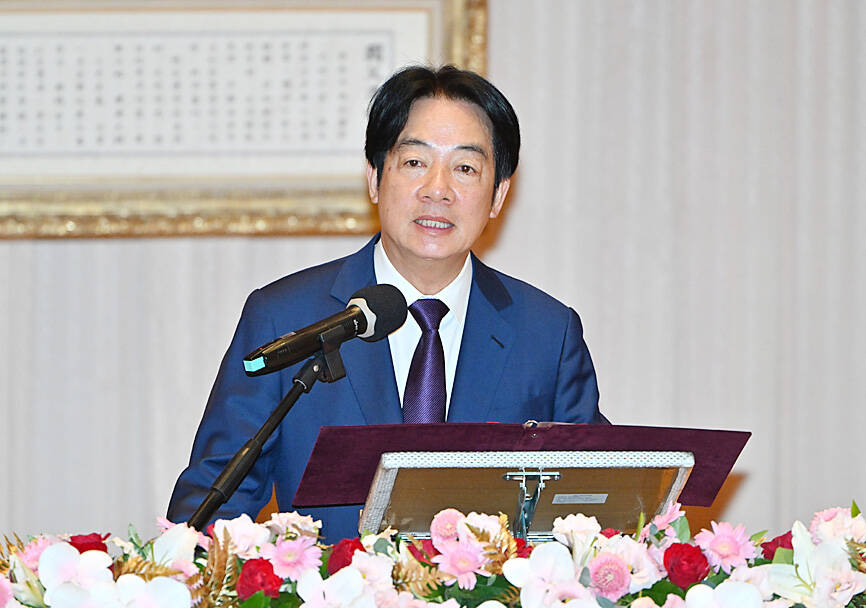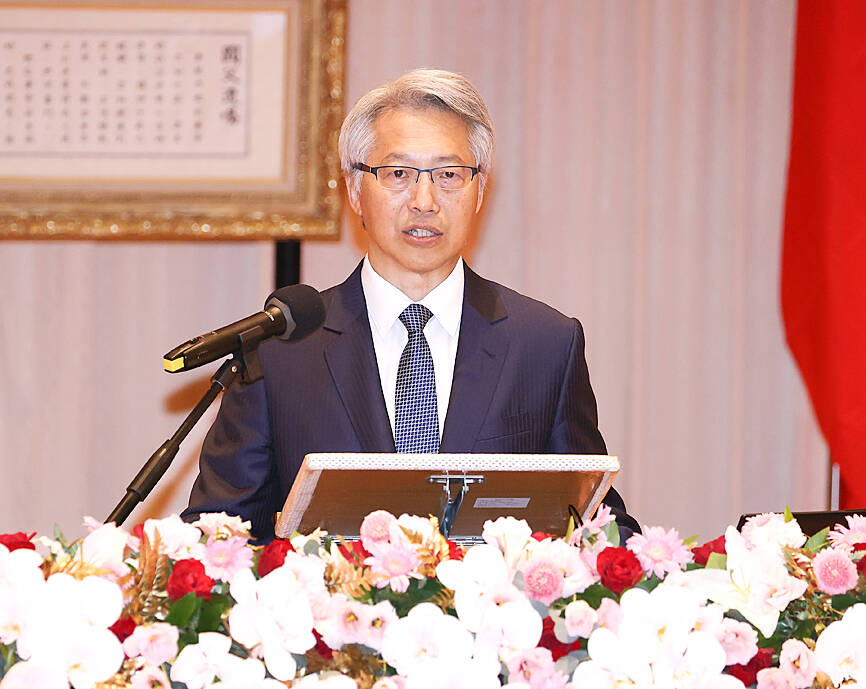President William Lai (賴清德) yesterday said he expects the nation’s academics to continue to boost the nation’s scientific research capabilities.
“Academia Sinica, being Taiwan’s highest research institution, has been leading Taiwan forward by offering advice on government policies,” Lai said in his opening address at the 35th Convocation of Academicians, which was attended by more than 200 academicians.
This year’s convocation, which runs until Thursday, is also to elect academicians and honorary academicians of Academia Sinica, the nation’s top academic institution.

Photo: Tien Yu-hua, Taipei Times
This is the first time the nominees’ Republic of China citizenship had to be verified prior to the election, and also the first time the biennial event was held with full in-person attendance at the institution in Taipei’s Nangang District (南港) since the COVID-19 pandemic.
Lai lauded Academia Sinica’s dedication to “cultivating talent for Taiwan in collaboration with universities on more than 100 course programs in the fields of humanities and social sciences.”
Academia Sinica developed the first quantum computer based on 5-quantum-bit chips in Taiwan, further assisting the Industrial Technology Research Institute in developing related modules and components and marking a significant milestone in Taiwan’s technological development, Lai said.

Photo: CNA
To cope with climate change, Academia Sinica collaborated with Taiwan Power Co (台電) in researching methane pyrolysis technology for electricity generation, in addition to cooperating in studies on developing geothermal power, solar power and ocean power to generate electricity, he said.
Academia Sinica also seeks to integrate artificial intelligence (AI) technology into medical and ecological applications in response to Taiwan becoming an “AI island,” while ensuring personal data safety for research fellows to access the information needed, he said.
Lai also thanked the institution for establishing the South Campus in Tainan, where he was elected mayor twice — in 2010 and 2014.
The contributions made by Academia Sinica’s academicians and researchers would lead Taiwan to rival the world’s best in scientific research and bolster the nation’s international influence, he said.
Academia Sinica President James Liao (廖俊智) said the institution has established an AI promotion office and would focus on how it can best be applied to humanities-based research.
The institution will take advantage of its rich humanities and sociology-related database to explore the use of AI in these fields while reviewing its impact on society, he said.
Noting that the AI boom has just started and raises many potential legal and ethical issues, he said that by promoting the deployment of AI in the humanities and social sciences, “we hope to let students who were interested in these areas but turned to AI realize that studying humanities and social sciences is a good way to apply AI.
Additional reporting by CNA

A magnitude 7.0 earthquake struck off Yilan at 11:05pm yesterday, the Central Weather Administration (CWA) said. The epicenter was located at sea, about 32.3km east of Yilan County Hall, at a depth of 72.8km, CWA data showed There were no immediate reports of damage. The intensity of the quake, which gauges the actual effect of a seismic event, measured 4 in Yilan County area on Taiwan’s seven-tier intensity scale, the data showed. It measured 4 in other parts of eastern, northern and central Taiwan as well as Tainan, and 3 in Kaohsiung and Pingtung County, and 2 in Lienchiang and Penghu counties and 1

FOREIGN INTERFERENCE: Beijing would likely intensify public opinion warfare in next year’s local elections to prevent Lai from getting re-elected, the ‘Yomiuri Shimbun’ said Internal documents from a Chinese artificial intelligence (AI) company indicated that China has been using the technology to intervene in foreign elections, including propaganda targeting Taiwan’s local elections next year and presidential elections in 2028, a Japanese newspaper reported yesterday. The Institute of National Security of Vanderbilt University obtained nearly 400 pages of documents from GoLaxy, a company with ties to the Chinese government, and found evidence that it had apparently deployed sophisticated, AI-driven propaganda campaigns in Hong Kong and Taiwan to shape public opinion, the Yomiuri Shimbun reported. GoLaxy provides insights, situation analysis and public opinion-shaping technology by conducting network surveillance

‘POLITICAL GAME’: DPP lawmakers said the motion would not meet the legislative threshold needed, and accused the KMT and the TPP of trivializing the Constitution The Legislative Yuan yesterday approved a motion to initiate impeachment proceedings against President William Lai (賴清德), saying he had undermined Taiwan’s constitutional order and democracy. The motion was approved 61-50 by lawmakers from the main opposition Chinese Nationalist Party (KMT) and the smaller Taiwan People’s Party (TPP), who together hold a legislative majority. Under the motion, a roll call vote for impeachment would be held on May 19 next year, after various hearings are held and Lai is given the chance to defend himself. The move came after Lai on Monday last week did not promulgate an amendment passed by the legislature that

AFTERMATH: The Taipei City Government said it received 39 minor incident reports including gas leaks, water leaks and outages, and a damaged traffic signal A magnitude 7.0 earthquake struck off Taiwan’s northeastern coast late on Saturday, producing only two major aftershocks as of yesterday noon, the Central Weather Administration (CWA) said. The limited aftershocks contrast with last year’s major earthquake in Hualien County, as Saturday’s earthquake occurred at a greater depth in a subduction zone. Saturday’s earthquake struck at 11:05pm, with its hypocenter about 32.3km east of Yilan County Hall, at a depth of 72.8km. Shaking was felt in 17 administrative regions north of Tainan and in eastern Taiwan, reaching intensity level 4 on Taiwan’s seven-tier seismic scale, the CWA said. In Hualien, the